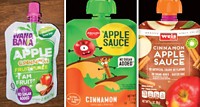Advertisement
Grab your lab coat. Let's get started
Welcome!
Welcome!
Create an account below to get 6 C&EN articles per month, receive newsletters and more - all free.
It seems this is your first time logging in online. Please enter the following information to continue.
As an ACS member you automatically get access to this site. All we need is few more details to create your reading experience.
Not you? Sign in with a different account.
Not you? Sign in with a different account.
ERROR 1
ERROR 1
ERROR 2
ERROR 2
ERROR 2
ERROR 2
ERROR 2
Password and Confirm password must match.
If you have an ACS member number, please enter it here so we can link this account to your membership. (optional)
ERROR 2
ACS values your privacy. By submitting your information, you are gaining access to C&EN and subscribing to our weekly newsletter. We use the information you provide to make your reading experience better, and we will never sell your data to third party members.
Food Ingredients
California passes bill to ban 6 dyes in school food
Governor must sign or veto legislation by the end of September
by Britt E. Erickson
September 5, 2024
| A version of this story appeared in
Volume 102, Issue 28

California could soon become the first state in the US to ban artificial color additives in food served in K-12 public schools. On Aug. 29, lawmakers passed the California School Food Safety Act (AB 2316). The bill now heads to Governor Gavin Newsom, who must either sign or veto it by the end of September.
The legislation targets six synthetic food dyes—Red No. 40, Yellow No. 5 and No. 6, Blue No. 1 and No. 2, and Green No. 3—that California’s Office of Environmental Health Hazard Assessment has linked to hyperactivity and other adverse behavioral effects in some children. It would prohibit public schools in California from serving or selling food that contains any of the chemicals, effective Dec. 31, 2027. Children could still eat food containing the dyes at school, as long as it was brought in from elsewhere. Food sold in schools for fundraising purposes would also be exempt from the ban.
California has the largest public school system in the US, with nearly 6 million students and more than 10,000 schools.
“California has a responsibility to protect our students from chemicals that harm children and interfere with their ability to learn,” Assemblymember Jesse Gabriel, who introduced the bill, says in a statement in response to the bill’s passage. “This bill will empower schools to better protect the health and wellbeing of our kids and encourage manufacturers to stop using these harmful additives.”
Last year, California banned four chemicals—brominated vegetable oil, potassium bromate, propylparaben, and Red No. 3 dye—in food sold in the state. That legislation, which Gabriel also introduced, prompted the US Food and Drug Administration to ban brominated vegetable oil in food this July. It also started a national conversation about the safety of chemical additives in food.





Join the conversation
Contact the reporter
Submit a Letter to the Editor for publication
Engage with us on Twitter